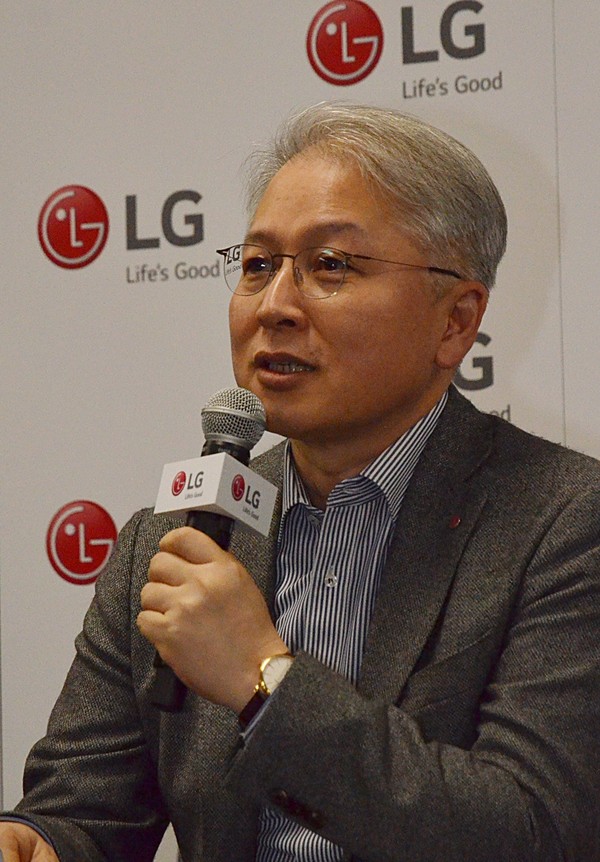By Jeon Seung-min WIRED Korea
LAS VEGAS (WIRED Korea) --- A critical task for consumer electronics giant LG is to put an end to losses chronically sustained by its smartphone and mobility businesses.
The losses are undoubtedly a humiliation to its new CEO, Kwon Bong-seok, who came here, leading the company’s delegation to CES 2020. “We told the press here last year and we are reiterating this year again that we will turn it (the smartphone business) around in 2021.”

Mobile Communications, an LG unit responsible for smartphone business, sustained a loss for the 19th consecutive quarter last quarter. This sector, together with Vehicle Solutions, contributed to the company’s lackluster performance last year.
Kwon, who took the top management post last month, also promised to make Vehicle Solutions profitable next year, a unit that provides automotive components and software solutions. He said, “Our past efforts will bear fruit (in the mobility sector) next year."
In 2019, LG Electronics had an operating profit of 2,432.9 billion won on 62,306 billion won in sale. Losses from Mobile Communications and Vehicle Solutions, which Daishin Securities put at 934 billion won and 191 billion won in its estimation, respectively, helped cut the company’s operating profit by 10 percent from 2018.
Yet, Kwon believes his company’s technological prowess will help pull the two hemorrhaging sectors out of their losses.
“Some say we are not capable of making foldable phones because we have no underlying technology,” he said. “We have told you in the past to determine whether we are not making them because we don’t want to or because we have no (required) technology. I wouldn’t like you to think that a company having rollable TVs on display here now find it technologically difficult to make foldable phones.”
On display in the LG booth at CES is a new version of the company’s rollable TV display, which comes down from the ceiling. The first version, which was unveiled at CES 2019, was flexible enough to roll up, but it needed a TV stand. LG has yet to roll out rollable TV for mass marketing.
About the delay, Kwon said, “It takes time until we put our factory in Guangzhou, China, in operation, and we are conducting quality tests until we are satisfied. We are planning to put it on the market in the first half this year, and in the third quarter at the latest.”
Alluding to his company’s competition with Samsung Electronics, he said an increasing number of top-tier TV producers are adopting the OLED display technology, one that is led by LG.
Samsung has espoused the QLED technology for its high-end TV models. OLED is an advanced technology fundamentally different from LCD, which is today’s major type of display technology. QLED is a variation of LED LCD, with a quantum dot film added to the LCD “sandwich.”
He said an OLED alliance will be able to meet a market demand for 10 million OLED TV sets next year, with about 3 million of them being premium products, each of them priced higher than $2,000.
Asked if OLED-based 8K resolution TV sets wouldn’t be too high priced to be sold in the market, he said his company has a competitive advantage not only in OLED but in LCD against its rivals.
He presented what he called a transition to digital as the catchphrase for the management of the company under his leadership. “For instance, all you have to do with a packaged food is put the QR code to an oven before putting the food inside,” he said, adding that punching a set of buttons would not be needed.
A transition to digital, he said, will help provide his company with another momentum for growth in what he believed will shape up to be an unstable global market. Here, he believes the use of artificial intelligence for LG products will play a key role.
In addition to collaboration with global players in this regard, he said his company will launch joint projects with Seoul National University’s AI research center and hire AI experts that have worked with 5G mobile networks.
These changes, he said, are needed to meet changing consumer demands and effectively respond to changes in consumption patterns. “We will take a proactive approach and provide our clients with differentiated values.”
When reminded that his company did not perform well in the fourth quarter last year, he put on a bold face and said that there are ups and downs for all manufacturers. “We will ride on the usual business cycle and perform better in the first half of this year,” he said. “Given our good performance in the home appliances and other sectors, we have few problems with our competiveness in the market.”
The above is a translation of Jeon Seung-min’s Korean-language article by Choi Nam-hyun, deputy editor in chief at WIRED Korea.


 뉴스레터 신청
뉴스레터 신청